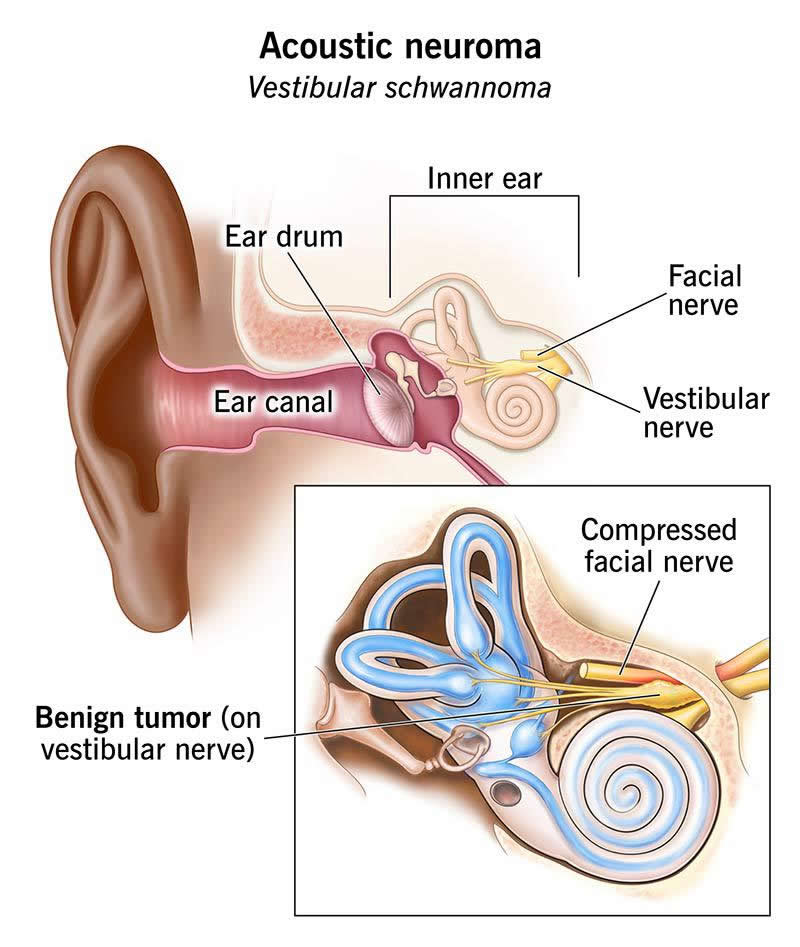Acoustic Neuroma
Acoustic neuromas (vestibular schwannomas) are benign (noncancerous) tumors that can affect the nerves that help you hear and maintain your balance. Depending on their size and symptoms, your provider may suggest monitoring or surgery.
What Is an Acoustic Neuroma?

An acoustic neuroma, also called a vestibular schwannoma, is a noncancerous (benign) ear tumor that affects your hearing and sense of balance. It grows on the nerve that sends signals from your inner ear to your brain. It’s called your 8th cranial nerve (vestibulocochlear nerve).
As acoustic neuromas grow, they can affect hearing, cause ringing in your ear (tinnitus), affect balance, and cause facial weakness or facial numbness. Treatment may include surgery, radiation therapy and, in rare cases, chemotherapy to treat the tumor.
These tumors aren’t common. Each year, about 1 in 100,000 people develop an acoustic neuroma.
Symptoms and Causes
Acoustic neuroma symptoms
Symptoms depend on the tumor’s size and location. Early signs often include hearing loss in one ear and:
Vestibular schwannomas grow very slowly. As they grow, they may cause the following symptoms:
- Facial paralysis or numbness
- Headaches
- Nausea and vomiting
- Changes in your sense of taste
- Difficulty swallowing
- Blurred vision or double vision
Acoustic neuroma causes
These tumors form when Schwann cells multiply. Schwann cells support and protect the balance and hearing nerves in your peripheral nervous system. Researchers aren’t sure why they multiply.
Risk factors of an acoustic neuroma
If you have neurofibromatosis type 2, you may be at an increased risk for a type of vestibular schwannoma called bilateral acoustic neuroma. This tumor affects the hearing (auditory) nerves on both sides of your brain.
Vestibular schwannoma complications
While rare, a tumor may grow large enough to be life-threatening. This happens when it presses on the part of your brain that manages the flow of spinal fluid.
Diagnosis and Tests
How doctors diagnose an acoustic neuroma
To diagnose a vestibular schwannoma, a healthcare provider will ask about your symptoms and do a physical exam. From there, they may recommend several tests, including:
- Imaging tests, like MRI and CT scans
- Hearing tests, including auditory brainstem response
- Balance tests
- Electronystagmography
Management and Treatment
How is an acoustic neuroma treated?
Vestibular schwannoma treatment options include:
- Observation: If the tumor isn’t growing and you have no symptoms, your provider may recommend regular MRIs to look for changes.
- Stereotactic radiosurgery: This uses focused beams of radiation to treat the tumor and protect healthy tissue nearby.
- Surgery: A surgeon uses small tools to remove the tumor (microsurgery). This is the only treatment that can fully get rid of an acoustic neuroma.
- Chemotherapy: In rare cases, providers may use a drug called bevacizumab (Alymsys®, Avastin®, MVASI®, Zirabev®). It may shrink tumors. For children, it may help them keep their hearing longer. It also treats radiation side effects (necrosis).
- Vestibular rehabilitation therapy: This therapy helps improve balance if surgery affects the nerves that control it.
Treatments vary depending on factors like:
- The tumor size and location
- How the tumor affects your hearing and balance
- Your age and overall health
Acoustic neuroma surgery
There are a few different ways surgeons can remove an acoustic neuroma. This depends on the tumor’s size and location. Each approach involves carefully reaching the tumor through your skull and separating it from nearby nerves. Your surgeon will choose the method that’s safest and most effective for your specific case.
Your care team will talk with you about possible complications after surgery, like hearing loss, balance problems, facial weakness or infection. They’ll also explain how to treat or manage these issues, if needed.
When should I see my healthcare provider?
If you have an acoustic neuroma, your provider may decide to watch it closely instead of treating it right away. It’s normal to feel nervous or worry that any changes in your hearing or balance mean the tumor is growing. Ask your provider which changes might be a red flag. If you notice these concerning symptoms, let your provider know. They may suggest a different treatment.
What questions should I ask my healthcare provider?
You may consider asking your healthcare provider:
- Do I need treatment or will you simply monitor the tumor?
- What’s the chance I’ll have useful hearing in my ear?
- How likely is it that the acoustic neuroma will come back after surgery or radiation therapy?
- Am I at higher risk for other types of tumors?
- What are the risks and benefits of acoustic neuroma surgery?
- Will I need rehabilitation after surgery?
Outlook / Prognosis
What can I expect if I have a vestibular schwannoma?
That depends on your condition, the type of surgery you have and any possible complications. Your provider will explain your treatment plan and what to expect, including:
- Treatment options if the tumor comes back
- Hearing devices that may help after surgery, like bone conduction implants or CROS (contralateral routing of signals) hearing aids
A note from Wockr
Feeling off balance, physically and emotionally, can be hard. Especially when you’re worried about losing your hearing. Acoustic neuromas grow slowly, but reach out to a provider if you notice symptoms. They may recommend watching and waiting instead of starting treatment right away. That’s because treatments like surgery or radiation, while effective, can be tough on your body.
It’s normal to feel anxious. Don’t hesitate to ask questions. No concern is too small. Your care team can help you understand what symptoms to look out for, when treatment might be needed and how to take care of yourself. And if you need emotional support, consider joining a support group or talking with a mental health professional.